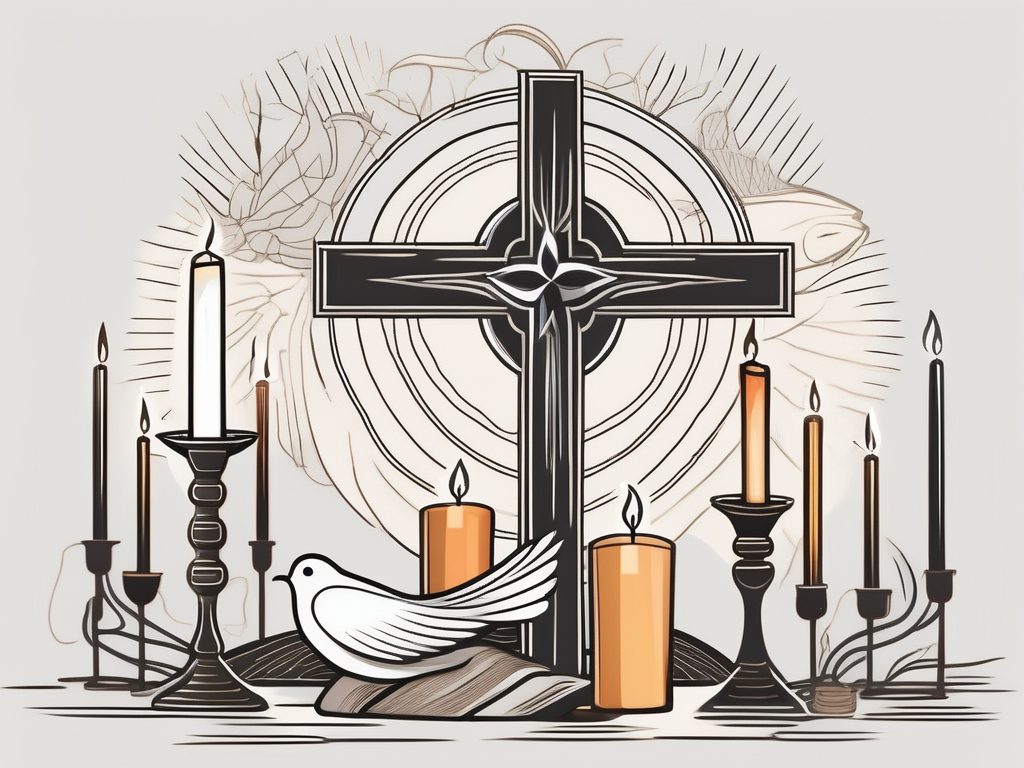Welcome to “What Do Christians Do: A Comprehensive Guide to Christian Practices.” In this article, we will explore the various aspects of Christianity and the practices that shape the lives of Christians worldwide. From understanding the origins and history of Christianity to the role of prayer, sacraments, and worship services, we will provide you with a comprehensive overview of Christian practices.
Understanding Christianity: An Overview
Before delving into the specific practices of Christianity, it is essential to have a basic understanding of this major world religion. Christianity originated over two thousand years ago and has since become one of the most widely followed faiths globally. It is based on the teachings of Jesus Christ and centers around the belief that he is the Son of God and the Savior of humanity.
The Origins and History of Christianity
Christianity traces its roots back to the life and teachings of Jesus Christ in the first century AD. From his birth in Bethlehem to his crucifixion and resurrection, the life of Jesus serves as the foundation of this faith. Jesus’ birth is celebrated on Christmas, a holiday observed by Christians around the world. His crucifixion, which symbolizes his sacrifice for humanity’s sins, is commemorated on Good Friday. The resurrection of Jesus, known as Easter, is the most important event in the Christian calendar, signifying victory over death and the promise of eternal life.
After his death, the apostles, who were his closest followers, spread his teachings, establishing communities of believers. These early Christian communities faced persecution from the Roman Empire, which saw their monotheistic beliefs as a threat to the established order. Despite this persecution, Christianity continued to spread, gaining followers from diverse backgrounds and cultures.
Over time, Christianity evolved and went through significant historical events, shaping its beliefs and practices into what we see today. One of the most significant events in Christian history was the conversion of the Roman Emperor Constantine to Christianity in the 4th century AD. This marked a turning point for the religion, as it gained official recognition and support from the Roman Empire. The influence of Christianity continued to grow, eventually becoming the dominant religion in Europe during the Middle Ages.
Key Beliefs and Principles of Christianity
At the core of Christian beliefs are the concepts of God’s love, forgiveness, and salvation. Christians believe that through faith in Jesus Christ, they can attain eternal life and reconciliation with God. This belief in salvation is central to the Christian faith, as it offers hope and assurance of a meaningful existence beyond earthly life.
Another fundamental belief in Christianity is the concept of the Trinity. Christians believe in one God who exists in three persons: the Father, the Son (Jesus Christ), and the Holy Spirit. This belief in the Trinity reflects the complex nature of God and the interconnectedness of the divine beings.
The divinity of Jesus is another key belief in Christianity. Christians believe that Jesus is not only the Son of God but also fully divine. This belief is based on the teachings of the New Testament, which describe Jesus performing miracles, proclaiming his divinity, and ultimately rising from the dead.
The authority of the Bible is also central to Christian faith. The Bible is considered the inspired word of God and serves as a guide for moral and spiritual living. It is divided into the Old Testament, which contains the sacred texts of Judaism, and the New Testament, which focuses on the life, teachings, and ministry of Jesus Christ.
Living a righteous and compassionate life is emphasized in Christianity. Christians are called to follow the teachings of Jesus, which include loving one’s neighbor, showing kindness and mercy, and seeking justice for the marginalized and oppressed. This emphasis on ethical living is seen in various Christian traditions, such as acts of charity, community service, and social justice advocacy.
In conclusion, Christianity is a rich and diverse religion with a long and complex history. Its origins can be traced back to the life and teachings of Jesus Christ, and its beliefs and practices have evolved over time. At its core, Christianity emphasizes the love of God, salvation through Jesus Christ, and the importance of living a righteous and compassionate life.
The Role of Prayer in Christian Life
Prayer is an integral part of Christian practice and serves as a means of communication with God. It is a personal and communal act that allows Christians to express gratitude, seek guidance, and find solace in times of need.
Prayer is not just a religious duty but a heartfelt conversation with the divine. It is a way for Christians to connect with God on a personal level, sharing their joys, sorrows, hopes, and fears. Through prayer, believers can express their gratitude for God’s blessings and seek His guidance in making important decisions. It is a means of finding solace and comfort in times of distress, knowing that God is always there to listen and provide support.
The Purpose and Significance of Prayer
Prayer serves multiple purposes in the Christian faith. It offers individuals a way to deepen their relationship with God, seek His will, and find comfort and strength. Additionally, prayer creates a sense of community, as Christians come together to pray for shared concerns and intercede for others.
One of the primary purposes of prayer is to deepen the relationship between believers and God. Through prayer, Christians can experience a sense of intimacy with the divine, knowing that they are heard and loved. It is a way to align one’s will with God’s, seeking His guidance and wisdom in all aspects of life.
Furthermore, prayer provides comfort and strength in times of difficulty. It is a source of solace for those facing challenges, offering a space to pour out their hearts and find reassurance in God’s presence. In prayer, Christians find the strength to persevere, knowing that they are not alone in their struggles.
Another significant aspect of prayer is its communal nature. Christians often come together to pray for shared concerns, such as the well-being of their families, communities, and the world at large. This collective prayer creates a sense of unity and solidarity among believers, fostering a deeper sense of community and shared purpose.
Different Forms of Christian Prayer
Christian prayer encompasses various forms and practices. It includes personal prayer, where individuals pray on their own, often in silence or using written prayers. It also includes communal prayer, such as group prayer meetings, church services, and even prayer vigils. The Lord’s Prayer, taught by Jesus to his disciples, is a widely recognized and frequently recited prayer by Christians.
Personal prayer is a deeply personal and intimate form of communication with God. It can take many forms, including silent meditation, reciting written prayers, or simply speaking from the heart. In personal prayer, individuals have the freedom to express their thoughts, emotions, and desires to God in their own unique way.
Communal prayer, on the other hand, involves coming together as a group to pray. This can take place in various settings, such as prayer meetings, church services, or even prayer circles. In these gatherings, believers join their voices and hearts to lift up their concerns and intercede for others. Communal prayer not only strengthens the bond between believers but also amplifies the power of their prayers through collective faith.
One of the most well-known prayers in Christianity is the Lord’s Prayer, taught by Jesus to his disciples. This prayer serves as a model for believers, guiding them in how to approach God and express their needs. It covers various aspects of life, including acknowledging God’s holiness, seeking His kingdom, asking for daily provision, seeking forgiveness, and seeking deliverance from evil.
In conclusion, prayer plays a vital role in the Christian life. It is a means of communication with God, allowing believers to deepen their relationship with Him, seek His will, and find comfort and strength. Through personal and communal prayer, Christians can express their gratitude, share their concerns, and intercede for others. Prayer is a powerful and transformative practice that shapes the lives of believers and strengthens their faith.
The Sacraments in Christianity
The sacraments are central to Christian worship and belief. They are sacred rituals that reflect important aspects of Christian theology and provide opportunities for believers to encounter the presence of God.
These sacraments hold deep meaning and significance for Christians, serving as tangible expressions of their faith and relationship with God. Through these rituals, believers are able to connect with the divine and experience a sense of spiritual renewal and transformation.
Baptism and Its Importance
Baptism is a sacrament that signifies spiritual rebirth and initiation into the Christian community. It involves the ritualistic application of water, representing purification and becoming part of the body of Christ. Baptism holds great significance as it symbolizes dying to one’s old self and being raised to a new life in Christ.
When a person is baptized, they are publicly declaring their commitment to follow Jesus and live according to his teachings. It is a powerful moment of surrender and surrendering to God’s grace and mercy, as well as a celebration of new beginnings and the promise of eternal life.
Furthermore, baptism is not just an individual act but also a communal one. It is a joining together of believers, a recognition of the interconnectedness of the body of Christ. Through baptism, individuals become part of a larger spiritual family, united by their shared faith and commitment to Christ.
Understanding the Eucharist
The Eucharist, also known as Communion or the Lord’s Supper, commemorates the Last Supper of Jesus with his disciples. It involves the sharing of bread and wine, which symbolize Christ’s body and blood. The Eucharist represents the spiritual nourishment and unity of the Christian community with Christ.
During the Eucharist, believers partake in the bread and wine as a way of remembering and participating in the sacrifice of Jesus on the cross. It is a solemn and sacred moment of reflection, gratitude, and communion with God.
Through the act of receiving the Eucharist, Christians are reminded of their dependence on Christ for spiritual sustenance and are invited to deepen their relationship with him. It is a tangible reminder of God’s love and grace, as well as a call to live out the teachings of Jesus in their daily lives.
Moreover, the Eucharist serves as a unifying force within the Christian community. As believers come together to partake in this sacrament, they are reminded of their shared faith and the bond they have with one another through their common belief in Christ. It is a powerful symbol of unity and solidarity, fostering a sense of belonging and togetherness among believers.
The Christian Calendar: Celebrations and Observances
The Christian calendar is marked by various celebrations and observances that hold special significance for believers. These events highlight key moments in the life of Jesus and evoke reflection, worship, and devotion.
The Significance of Christmas and Easter
Christmas and Easter are two prominent Christian holidays. Christmas celebrates the birth of Jesus, while Easter commemorates his resurrection. These occasions provide Christians with an opportunity to reflect on the love and sacrifice of Jesus, deepen their faith, and come together in worship.
Lesser-Known Christian Holidays
Aside from Christmas and Easter, Christianity recognizes several other significant holidays. These include Pentecost, which commemorates the descent of the Holy Spirit upon the disciples, and Lent, a period of reflection and preparation leading up to Easter. Each holiday offers unique opportunities for Christians to engage in spiritual practices and deepen their connection with God.
Christian Worship Services: Structure and Elements
Christian worship services provide believers with a designated time and space for communal worship, fellowship, and learning. While the specific structure and elements may vary across different denominations, certain components are commonly found in Christian worship.
The Role of Sermons in Worship
One integral element of Christian worship is the sermon. The sermon is a message or teaching delivered by a clergy member, focusing on biblical passages, spiritual insights, and practical application. It serves as a way to instruct, inspire, and challenge listeners in their faith.
Music and Hymns in Christian Worship
Music plays a vital role in Christian worship, providing a medium for adoration, praise, and reflection. Hymns and worship songs are sung collectively, expressing devotion to God and reinforcing biblical truths. Music can also evoke emotion and foster a sense of unity and connection among worshipers.
As you can see, Christianity encompasses a wide range of practices that shape the lives of its followers. From prayer and sacraments to the celebration of significant events on the Christian calendar, the practices of Christianity serve to deepen faith, foster community, and provide avenues for encountering the divine. Whether you are a practicing Christian or simply curious about this faith, this comprehensive guide aims to shed light on the various practices that define Christianity.












